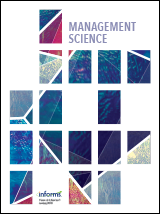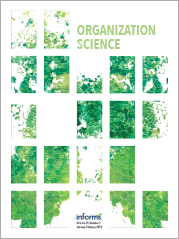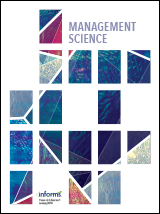Academic articles
Practitioner articles
Working papers
Books
Book chapters
Case studies
Other publications
Keyword(s)
artificial intelligence, business intelligence, data analytics, innovation,innovation management, open innovation
Volume
67
Journal Pages
5–20
Subject(s)
Information technology and systems; Management sciences, decision sciences and quantitative methods; Technology, R&D management
Keyword(s)
information design, supply chain management, newsvendor model, forecast sharing
This paper studies an information design problem of a retailer in a two-tier supply chain that procures a single type of product from a supplier. The supplier needs to decide on a production quantity by balancing the shortage cost and the excess inventory holding cost with respect to the retailer’s demand. The retailer’s demand is random but the retailer receives an informative signal about the demand before the supplier sets the production quantity, and places orders after learning the demand realization. The retailer wants to reduce the shortage cost, and to this end she can disclose information about her signal to persuade the supplier to increase production levels. For this setup, we characterize the optimal information disclosure policy of the retailer, and shed light on settings where the retailer strictly benefits from carefully designed information disclosure policies relative to a full- or a no-disclosure policy.
© 2024, INFORMS
ISSN (Online)
1526-5501
ISSN (Print)
0025–1909
Subject(s)
Economics, politics and business environment
Keyword(s)
Market Power, Search and Matching, Wages
JEL Code(s)
J31, J42
Volume
91
Journal Pages
3569–3607
Subject(s)
Economics, politics and business environment
Keyword(s)
Trade platform, hybrid business model, antitrust policy, tax policy
JEL Code(s)
D42, L12, L13, L40, H25
We provide a canonical and tractable model of a trade platform enabling buyers and sellers to transact. The platform charges a percentage fee on third-party product sales and decides whether to be "hybrid", like Amazon, by selling its own product. It thereby controls the number of differentiated products (variety) it hosts and their prices. Using the mixed market demand system, we capture interactions between monopolistically competitive sellers and a sizeable platform product. Using long-run aggregative games with free entry, we endogenize seller participation through an aggregate variable manipulated by the platform's fee. We show that a higher quality (or lower cost) of the platform's product increases its market share and the seller fee, and lowers consumer surplus. Banning hybrid mode benefits consumers. The hybrid platform might favor its product and debase third-party products if the own product advantage is sufficiently high. We also provide some tax policy implications.
© 2024 The Author(s). The RAND Journal of Economics published by Wiley Periodicals LLC on behalf of The RAND Corporation.
Volume
55
Journal Pages
684–718
Subject(s)
Health and environment; Management sciences, decision sciences and quantitative methods
Keyword(s)
mechanism design, information asymmetry, moral hazard, sustainable operations
JEL Code(s)
D21, D82, D86
Volume
72
Journal Pages
1843–1860
Subject(s)
Strategy and general management; Technology, R&D management
Peer evaluations place organizational members in a dual role: they evaluate their peers and are being evaluated by their peers. We theorize that when evaluating their peers, they anticipate how their evaluations will be perceived and adjust their evaluations strategically to be evaluated more positively themselves when their peers assess them. Building on this overarching claim of role duality resulting in strategic peer evaluations, we focus on a dilemma that evaluating members face: they want to leverage their evaluations of peers to portray themselves as engaged and having high standards, but at the same time, they must be careful not to offend anyone as doing so may cause retaliation. We suggest that organizational members about to be evaluated resolve this dilemma by participating in more peer evaluations but carefully targeting in which evaluations they participate. We test our theory by analyzing peer evaluations on Wikipedia, supplemented by in-depth semi-structured interviews. Our study informs research on peer evaluation and organizational design by revealing how being an evaluator and evaluated can make evaluations more strategic.
© 2023, INFORMS
Volume
35
Journal Pages
1363-1387
Keyword(s)
open science, team science, scientific transparency, metascience, crowdsourcing analysis
Volume
11
Subject(s)
Entrepreneurship; Human resources management/organizational behavior; Technology, R&D management
Keyword(s)
startup early employees, technology entrepreneurship, human capital, job choice, scientists and engineers
Early-stage technology startups rely critically on talented scientists and engineers to commercialize new technologies. And yet, they compete with large technology firms to hire the best workers. Theories of ability sorting predict that high ability workers will choose jobs in established firms that offer greater complementary assets and higher pay, leaving low ability workers to take lower-paying and riskier jobs in startups. We propose an alternative view in which heterogeneity in both worker ability and preferences enable startups to hire talented workers who have a taste for a startup environment, even at lower pay. Using a longitudinal survey that follows 2,394 science and engineering PhDs from graduate school into industrial employment, we overcome common empirical challenges by observing ability and stated preferences prior to first-time employment. We find that both ability and career preferences strongly predict startup employment, with high ability workers who prefer startup employment being the most likely to work in a startup. We show that this is due in part to the dual selection effects of worker preferences resulting in a large pool of startup job applicants, and startups “cherry picking” the most talented workers to make job offers to. Additional analyses confirm that startup employees earn approximately 17% lower pay. This gap is greatest for high ability workers and persists over workers’ early careers, suggesting that they accept a negative compensating differential in exchange for the non-pecuniary benefits of startup employment. This is further supported by data on job attributes and stated reasons for job choice.
© 2022, INFORMS
Volume
70
Journal Pages
3381–4165
ISSN (Online)
1526-5501
ISSN (Print)
0025–1909
Subject(s)
Economics, politics and business environment; Ethics and social responsibility; Human resources management/organizational behavior; Management sciences, decision sciences and quantitative methods
Keyword(s)
misinformation, fake news, morality, fuzzy-trace theory, gist, verbatim, partisan politics
Volume
57



